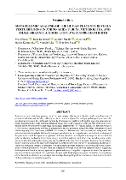| dc.contributor.author | Cífková, Eva | |
| dc.contributor.author | Karahoda, Rona | |
| dc.contributor.author | Stráník, Jaroslav | |
| dc.contributor.author | Abad Marcano, Cilia Lourdes | |
| dc.contributor.author | Kacerovský, Marian | |
| dc.contributor.author | Lísa, Miroslav | |
| dc.contributor.author | Štaud, František | |
| dc.date.accessioned | 2024-04-23T12:10:37Z | |
| dc.date.available | 2024-04-23T12:10:37Z | |
| dc.date.issued | 2024 | |
| dc.identifier.uri | https://hdl.handle.net/20.500.14178/2420 | |
| dc.description.abstract | Spontaneous preterm delivery presents one of the most complex challenges in obstetrics and is a leading cause of perinatal morbidity and mortality. Although it is a common endpoint for multiple pathological processes, the mechanisms governing the etiological complexity of spontaneous preterm birth and the placental responses are poorly understood. This study examined placental tissues collected between May 2019 and May 2022 from a welldefined cohort of women who experienced spontaneous preterm birth (n = 72) and healthy full -term deliveries (n = 30). Placental metabolomic profiling of polar metabolites was performed using Ultra -High Performance Liquid Chromatography/Mass Spectrometry (UHPLC/MS) analysis. The resulting data were analyzed using multi- and univariate statistical methods followed by unsupervised clustering. A comprehensive metabolomic evaluation of the placenta revealed that spontaneous preterm birth was associated with significant changes in the levels of 34 polar metabolites involved in intracellular energy metabolism and biochemical activity, including amino acids, purine metabolites, and small organic acids. We found that neither the preterm delivery phenotype nor the inflammatory response explain the reported differential placental metabolome. However, unsupervised clustering revealed two molecular subtypes of placentas from spontaneous preterm pregnancies exhibiting differential enrichment of clinical parameters. We also identified differences between early and late preterm samples, suggesting distinct placental functions in early spontaneous preterm delivery. Altogether, we present evidence that spontaneous preterm birth is associated with significant changes in the level of placental polar metabolites. Dysregulation of the placental metabolome may underpin important (patho)physiological mechanisms involved in preterm birth etiology and long-term neonatal outcomes. | en |
| dc.language.iso | en | |
| dc.relation.url | https://doi.org/10.17179/excli2023-6785 | |
| dc.rights | Creative Commons Uveďte původ 4.0 International | cs |
| dc.rights | Creative Commons Attribution 4.0 International | en |
| dc.title | Metabolomic analysis of the human placenta reveals perturbations in amino acids, purine metabolites, and small organic acids in spontaneous preterm birth | en |
| dcterms.accessRights | openAccess | |
| dcterms.license | https://creativecommons.org/licenses/by/4.0/legalcode | |
| dc.date.updated | 2024-10-25T11:41:05Z | |
| dc.subject.keyword | Placenta | en |
| dc.subject.keyword | preterm birth | en |
| dc.subject.keyword | metabolomics | en |
| dc.subject.keyword | inflammation | en |
| dc.subject.keyword | metabolism | en |
| dc.identifier.eissn | 1611-2156 | |
| dc.relation.fundingReference | info:eu-repo/grantAgreement/MSM//LX22NPO5107 | |
| dc.relation.fundingReference | info:eu-repo/grantAgreement/MZ0/NU/NU20-01-00264 | |
| dc.relation.fundingReference | info:eu-repo/grantAgreement/FN/I-FN/I-FNHK | |
| dc.relation.fundingReference | info:eu-repo/grantAgreement/UK/COOP/COOP | |
| dc.date.embargoStartDate | 2024-10-25 | |
| dc.type.obd | 73 | |
| dc.type.version | info:eu-repo/semantics/publishedVersion | |
| dc.identifier.doi | 10.17179/excli2023-6785 | |
| dc.identifier.utWos | 001166548100001 | |
| dc.identifier.obd | 647241 | |
| dc.identifier.pubmed | 38487084 | |
| dc.subject.rivPrimary | 30000::30100::30104 | |
| dcterms.isPartOf.name | EXCLI Journal | |
| dcterms.isPartOf.issn | 1611-2156 | |
| dcterms.isPartOf.journalYear | 2024 | |
| dcterms.isPartOf.journalVolume | 23 | |
| dcterms.isPartOf.journalIssue | February | |
| uk.faculty.primaryId | 113 | |
| uk.faculty.primaryName | Farmaceutická fakulta v Hradci Králové | cs |
| uk.faculty.primaryName | Faculty of Pharmacy in Hradec Kralove | en |
| uk.faculty.secondaryId | 51 | |
| uk.faculty.secondaryName | Fakultní nemocnice Hradec Králové | cs |
| uk.faculty.secondaryName | University Hospital Hradec Králové | en |
| uk.department.primaryId | 371 | |
| uk.department.primaryName | Katedra farmakologie a toxikologie | cs |
| uk.department.primaryName | Deparment of Pharmacology and Toxicology | en |
| uk.department.secondaryId | 5000000027 | |
| uk.department.secondaryName | Porodnická a gynekologická klinika | cs |
| uk.department.secondaryName | Department of Obstetrics and Gynecology | en |
| dc.description.pageRange | 264-282 | |
| dc.type.obdHierarchyCs | ČLÁNEK V ČASOPISU::článek v časopisu::původní článek | cs |
| dc.type.obdHierarchyEn | JOURNAL ARTICLE::journal article::original article | en |
| dc.type.obdHierarchyCode | 73::152::206 | en |
| uk.displayTitle | Metabolomic analysis of the human placenta reveals perturbations in amino acids, purine metabolites, and small organic acids in spontaneous preterm birth | en |

